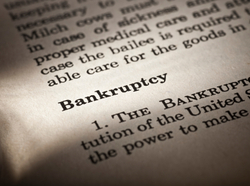Filing for Bankruptcy in Jacksonville is often a complicated and frustrating process. Many believe that bankruptcy in Florida simply wipes out a person’s debts — however, sometimes this is not the case. For example, federal law states that almost all types of debts arising from a divorce are non dischargeable. So, if you have gone through a Florida divorce and have a decree from a judge, the debts listed on that decree will likely not be discharged in a bankruptcy proceeding under most types of Florida bankruptcy proceedings.
Even if you have gone through a divorce, some of your debts arising from that divorce might be discharged if you qualify for a Chapter 13 Bankruptcy Plan. The differences between the different chapters of bankruptcy proceedings is complicated, which is why you should contact a Jacksonville Bankruptcy Attorney in order to help you understand your options.
Additionally, it might make sense for some to file bankruptcy in Jacksonville prior to filling for divorce. If you are considering filling for divorce, contact a Jacksonville Divorce Attorney to discuss your situation.
 Jacksonville Bankruptcy Lawyer Blog
Jacksonville Bankruptcy Lawyer Blog



 If you are one of the many people who walked away from your home before filing for bankruptcy, you might still owe the bank some cash. Generally, when you walk away from your mortgage, the bank will foreclose on your home, sell it, and likely take the loss on that sale (the selling price is usually lower than what you might have owed the bank).
If you are one of the many people who walked away from your home before filing for bankruptcy, you might still owe the bank some cash. Generally, when you walk away from your mortgage, the bank will foreclose on your home, sell it, and likely take the loss on that sale (the selling price is usually lower than what you might have owed the bank).  Yes it is possible for one spouse to file bankruptcy and the other not to file. This may beneficial in some cases, such as when the bulk of the debt is in one spouse’s name only. Be advised, however, that if the non-filing spouse is a co-debtor on a secured debt, the non-filing spouse will still be liable for such debt. Also, the spouse’s income must be disclosed and considered in the bankruptcy. Deciding if both spouses or just one spouse should file bankruptcy involves an in-depth legal analysis and should not be taken lightly. A
Yes it is possible for one spouse to file bankruptcy and the other not to file. This may beneficial in some cases, such as when the bulk of the debt is in one spouse’s name only. Be advised, however, that if the non-filing spouse is a co-debtor on a secured debt, the non-filing spouse will still be liable for such debt. Also, the spouse’s income must be disclosed and considered in the bankruptcy. Deciding if both spouses or just one spouse should file bankruptcy involves an in-depth legal analysis and should not be taken lightly. A